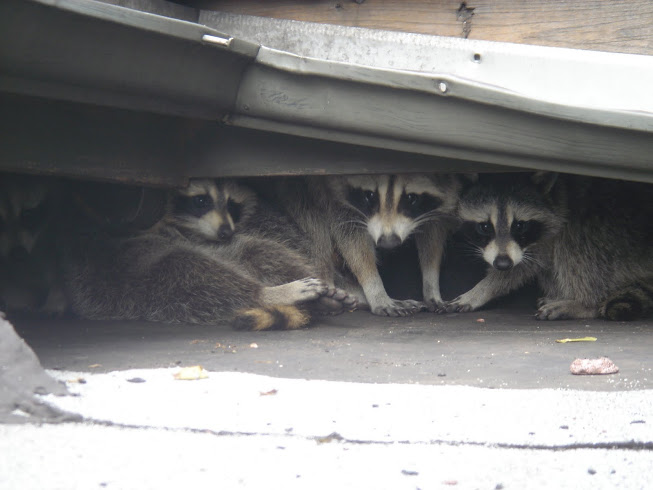1. Raccoons
Raccoons are intelligent and enterprising creatures that can enter your home through heating, ventilation and cooling vents or other types of ducts that have an outdoor access point. Last year, a Skedaddle technician removed a mother and her kits from a basement ceiling after red squirrels nested there previously. According to our team member, “the mother raccoon happened upon the red squirrel nest and it wasted no time displacing the previous tenants and making herself right at home.” Because mother raccoons may have up to five kits per litter, evicting her as soon as possible helped control the situation before it got out of hand.
You can recognize a raccoon by the black mask over its eyes and the rings on its tail. These animals have clever paws and plump bodies covered in grey fur. If you encounter a raccoon in your basement, it is wise to call us right away. Cornering such a creature can be dangerous, especially if it has babies stashed away somewhere in your ceiling.
2. Squirrels
These rodents, with their bushy tails and bright eyes, are clever and industrial. They are expert foragers and store food away once they find a safe place for it, such as your basement. Squirrels can enter your basement through a vent and store food in the ductwork or chew into the ceiling with their powerful teeth.
A female squirrel may enter your basement looking for a safe place to have her pups, which could number anywhere from eight to 15. While they may appear friendly, these rodents may attack when cornered or chased and may claw or bite you if you try to handle them. Calling in our experienced wildlife removal team can prevent this dangerous situation.
3. Mice
Few animals have adapted better to living with humans than mice. There are many species that appear and behave in similar ways, with one or two differences. Most species of wild mice, such as deer and meadow mice, have furry tails and rounded ears. All mice are largely nocturnal and industrious about storing away food and building large nests in which to sleep and have their babies.
You may hear mice activity before you actually see these animals. If you do discover their pathways or uncover a nest, note the areas before you call us and do not try to handle or remove any pups you find. Despite their size, these rodents may bite when cornered, and they can deliver an especially painful bite if they feel threatened.
4. Birds
While birds are usually more comfortable nesting outdoors, they may find their way into your basement during cold weather. This can be more likely for nonmigratory bird species, such as sparrows. You can recognize these birds by their predominantly brown feathers with dark tips and a lighter breast.
Most small birds are not usually dangerous, but they may peck if you try to handle them. It is wise to leave a nest alone until you can call us in to remove it for you.
When wildlife tries to make a home in your basement, the resulting damage can be costly. Give us a call or contact us online for help with removing unwanted animals from your home.



